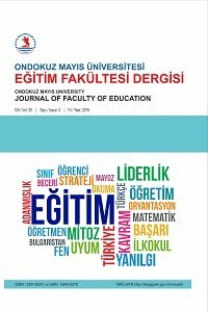İLKÖĞRETİM 5. SINIF ÖĞRENCİLERİNİN BAZI EVRENSEL DEĞERLERİ KAZANIM DÜZEYLERİNİN KARŞILAŞTIRILMASI (SAMSUN İLİ ÖRNEĞİ)*
Ülkemizde Milli Eğitim Bakanlığı’nın belirlediği merkezden oluşturulan resmî eğitim programları uygulanmaktadır. Bu programlar öğrencilerin davranışlarından, öğrenme-öğretme etkinliklerine ve bunların değerlendirilmesine rehberlik etmektedir. Programlar, bir ülkedeki sosyal ve kültürel bütünleşmeyi ve sürekliliği sağlayan en önemli dokümanlardır. Özellikle son onlu yıllarda hızla yok olmaya doğru giden değerlerimizi korumak, çocuklarımıza daha yaşanılabilir bir dünya bırakmak için Millî Eğitim Bakanlığı yeni geliştirdiği öğretim programlarına doğrudan değerlerimizle ilgili konuları yerleştirmiştir. Bu çerçevede, müfredat programlarında, özellikle ilköğretim Din Kültürü ve Ahlak Bilgisi, Sosyal Bilgiler, Hayat Bilgisi ve Düşünme Eğitimi derslerinde değerler ayrıntılı bir şekilde yer almaktadır. Bu çalışma ile ilköğretim Din Kültürü ve Ahlak Bilgisi, Sosyal Bilgiler ve Hayat Bilgisi programları içerisinde yer alan evrensel nitelikteki bazı değerlerin (hoşgörü, saygı, yardımseverlik, kültürel değerleri koruma ve geliştirme, doğruluk, dürüstlük ve özsaygı) Samsun İlinde sosyo-ekonomik düzey bakımından farklı ilköğretim okullarında kazanım düzeylerini karşılaştırmalı olarak ortaya koymak amaçlanmıştır. Araştırmaya konu olan değerlere ilişkin geliştirilen senaryolar öğrencilere uygulanmıştır. Yapılan çalışma sonunda elde edilen verilere göre, öğrencilerin araştırma kapsamında ele alınan değerlere yüksek seviyede sahip oldukları ve bu değerlerden en düşük düzeyde kazanılan değerin ‘dürüstlük’, en yüksek düzeyde kazanılan değerlerin ise ‘doğruluk’ ve ‘özsaygı’ olduğu görülmüştür. Değer kazanım düzeyleri cinsiyet değişkeni açısından incelendiğinde kazanım düzeyi en yüksek olan değerin kızlarda ‘doğruluk’, erkeklerde ‘saygı’, en düşük değerin ise kızlarda ‘saygı’ erkeklerde ise ‘özsaygı’ değeri olduğu görülmüştür. Değer kazanım düzeyleri sosyo-ekonomik durum değişkeni açısından incelendiğinde, sosyo-ekonomik düzey yükseldikçe ‘özsaygı’ düzeyinin de yükseldiği, sosyo-ekonomik düzey arttıkça ‘saygı’ ve ‘dürüstlük’ düzeyinin azaldığı söylenebilir. Zayıf gelirli ailelere sahip öğrencilerin ‘doğruluk’ değer kazanımı orta ve yüksek gelirli ailelerin öğrencilerinden daha yüksek olduğu bulunmuştur.
Anahtar Kelimeler:
Evrensel değerler, Kazanım, Değer düzeyi, Değer eğitimi, 5. Sınıf, Müfredat programları
COMPARİNG THE ACQUİSİTİON LEVELS OF SOME UNİVERSAL VALUES İN THE 5 th GRADE STUDENTS
In our country the official curriculum is implemented, which is prepared by an administrative centre of the ministry of national education. This curriculum guides student behavior, learning-teaching activities and their evaluation. A curriculum is the most important instrument which sustains the social and cultural union and ensures sustainability. The ministry of national education has included the subjects related to our direct moral values in its newly developped curriculum in order to maintain our moral values which have been deteriorating rapidly especially in the last decades and leave a viable world to our pupils.In this framework the moral values feature especially in the curriculum of the subjects such as Religious and Moral Studies for Primary Schools, Social Studies, Knowledge of Life, Teaching Reasoning in a detailed way. In this study we have tried to expose in a comparative way the acquisition level of some universal moral values (tolerance, respect, helpfulness, protection and development of cultural values, accuracy, honesty and self-respect) included in the curriculum of Religious and Moral Studies for Primary Schools, Social Studies, Knowledge of Life in primary schools in the Province of Samsun which are different from each other in terms of socio-economic standards. The scenarios developped in accordance with the moral values studied have been carried out with the students. According to the results of the studies we have found out that the students have acquired the moral values studied in the scope of the studies, the least acquired moral value is ‘honesty’, the mostly acquired the moral value is ‘accuracy’ and ‘self respect’. When we studied the level of acquiring the moral values in terms of gender variable, we have also found out that the the highest level of acquisition is ‘accuracy’ among girls and it is ‘respect’ among boys while the least acquired moral value is ‘respect’ among girls and it is ‘self respect’ among boys. When we studied the level of acquisition of the moral values in terms of socio-economic standards` variable we can state that as the socio-economic standards are on the rise the ‘self respect’ is also on the rise, as the socio-economic standards are on the rise the level of ‘respect’ and ‘honesty’ become less. We have also found out that the level of acquisition of the moral value ‘accuracy’ among the students whose families have low income levels is higher than that of the students whose families have high income levels.
Keywords:
Universal values, The acquisition, Value acquisition level, Value education, Primary Curriculum.,
- ISSN: 1300-302X
- Yayın Aralığı: Yılda 2 Sayı
- Başlangıç: 1986
- Yayıncı: Ondokuz Mayıs Üniversitesi Eğitim Fakültesi
Sayıdaki Diğer Makaleler
Albert camus'nün söylence-romanı (roman-mythe) veba: Esinlendiği kaynaklar ve çağrıştırdığı simgeler
ALBERT CAMUS’NÜN SÖYLENCE-ROMANI (ROMAN-MYTHE) VEBA, ESİNLENDİĞİ KAYNAKLAR VE ÇAĞRIŞTIRDIĞI SİMGELER
ARKADAŞ BASKISINI BELİRLEME ÖLÇEĞİ: GELİŞTİRİLMESİ, GEÇERLİK VE GÜVENİRLİĞİ
Serkan Volkan SARI, Ahmet TEKBIYIK
DİKKAT STRATEJİLERİNE YÖNELİK UYARICI İŞARETLERİN PİYANO EĞİTİMİNDE KULLANILABİLİRLİĞİ
Ertan KUŞÇU, Osman COŞKUN, Erdinç ASLAN
İLKÖĞRETİM GÖRSEL SANATLAR DERSİ İÇİN BİR DEĞERLENDİRME MODELİ
İlköğretim ve ortaöğretim okulu öğretmenlerinin eğitim inançları
Aytunga OĞUZ, Yahya ALTINKURT, Kürşad YILMAZ
2005 SOSYAL BİLGİLER ÖĞRETİM PROGRAMI ÖĞRENME ALANLARIYLA İLGİLİ ATASÖZÜ VE DEYİMLER
